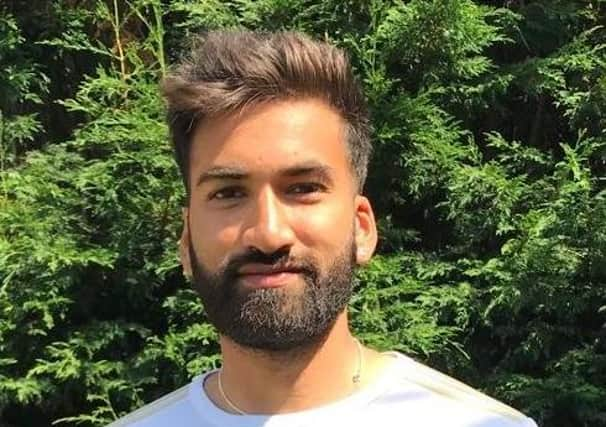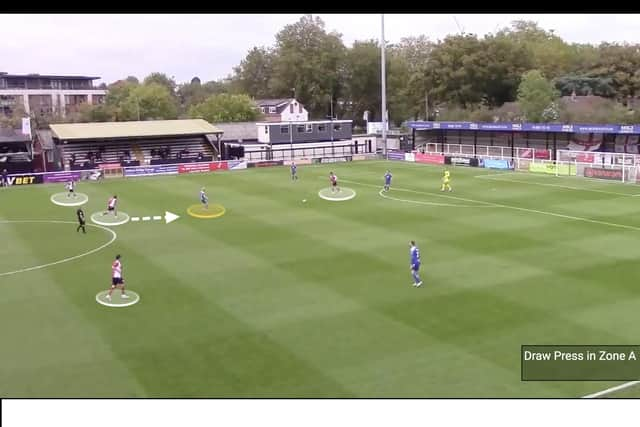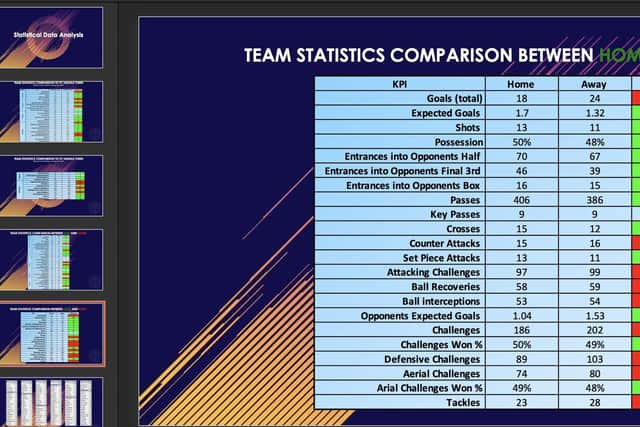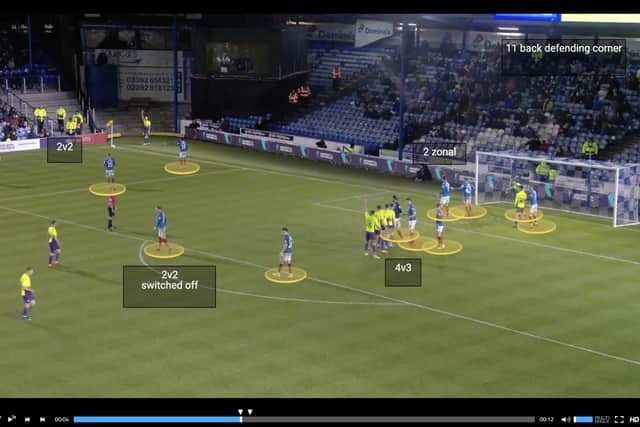FC Halifax Town: “It’s always the key information that you’re trying to get across” - Meet The Shaymen’s video and data analyst Dylan Mistry


FC Halifax Town’s video and data analyst plays a key role for the club behind-the-scenes, laying the foundations for the planning and preparation that goes into every game.
The process of what to expect from an opponent, how to counteract them and how to go about beating them starts with the work Mistry does.
Advertisement
Hide AdAdvertisement
Hide AdThe 24-year-old, who worked for Town boss Pete Wild at Oldham, produces in-depth analysis of opponents, as well as constantly reviewing Town’s performances, with the end goal of winning as many matches as possible.


“It’s basically looking at the opposition, our team and working out how we can relate our performance to win games and best suit how we want to play,” he said.
“The majority of it is down to our performance model, working closely with the gaffer and Milly (Chris Millington, assistant manager), how they want to play, and how we can win matches.
“Halifax’s budget isn’t obviously as big as it would be at Oldham, so the way I have to work is a bit different.
Advertisement
Hide AdAdvertisement
Hide Ad“There’s two types of analysis really - video analysis and data analysis.


“I’m predominantly video, although I’m always leaning to develop the data side of things.
“I look at about three games of the opposition before we play them, the work tends to be between me, Joe (Sargison, first-team coach) and Luke (Couchman, analyst), so we’ll pick out little bits about the opposition, little moments of the game, look at how they build, how they penetrate, how they look to finish their attacks.
“We’ll pick out key players and we’ll relate it to us, so how we look to set-up.
Advertisement
Hide AdAdvertisement
Hide Ad“Although at the end of the day football is about our team and what we do so, looking too much at opposition can give yourself a bit of a fight against yourself.


“I clip the games, clip the footage, and annotate for certain moments of how we want to play. We look at previous games they’ve played to see what can relate, and then Pete can show the players.
“Before the game, usually on a Wednesday night, we have a meeting on Zoom, all the coaching staff, and we have a report to go through, and we’ll pick out each bit.
“It’ll normally be me or Joe that presents the report, but Pete will have watched the opposition too so we’ll compare notes, and we’ll pose questions for things for him to think about when it comes to the coaching side, come the Thursday and Friday, ready for the match on Saturday or Tuesday.
Advertisement
Hide AdAdvertisement
Hide Ad“With the data, you’re picking out the key information really, and how it relates to us and the opposition.
“We link it into the players, so they get feedback. Which could be aerial duels, expected goals, shots on target from different areas on the pitch and other key performance indicators.”
Mistry sifts through hours of footage to find the most important moments that will inform Town’s preparations for the next game.
“Every team in the league will have their own style of play, so not every team will attack or defend the same, but they all have their general style of how they want to play, so it’s picking out the key patterns of what they’re doing, watching their movement off the ball, and their movement of the ball too,” he said.
Advertisement
Hide AdAdvertisement
Hide Ad“We use that information to inform what we do, picking out key moments and patterns so we can nullify their threats, and then pick out where we can exploit them.
“We watch every game of ours back and review them to our model, how we want to play, see where we are doing well and where we can improve.
“We’ll pick out themes across the season. It’s more about getting the consistency in your performances at a high level, rather than a lower level where you’re changing things week-in, week-out.
“It might be ‘we’re doing this well, but how do we use that to our advantage?’, and it’s the same where we’re not so good, how do we improve it, or stop it becoming something that opponents might exploit.
Advertisement
Hide AdAdvertisement
Hide Ad“There’s so many different things going on, you could pick out a million, but it’s about the key things.
“The thing with football is you’ve got so much information these days, there’s always a new stat for something, so it’s how you interpret the data.
“You might look at home and away fixtures and if the data changes between that, you might look at the data between their wins and losses, and individual players statistics.
“As a manager, Pete will have so much going on around him that he won’t want to be overloaded with information either.
Advertisement
Hide AdAdvertisement
Hide Ad“And there’s only so much you can remember. If I was to bombard you with loads of information on stats, how much of that will you remember?
“Probably only a little bit, so it’s making sure that little bit is the most important bit that you remember, and it sticks with him.
“There’s always something marginal that might help us in a game.
“There’s been times where we’ve seen something about the opposition that others haven’t, and it ends up affecting what we do in training.
Advertisement
Hide AdAdvertisement
Hide Ad“We throw in things for Pete to think about during games and during the season.
“We all work together to try and create the best outcome we possibly can.”
Mistry says the process of producing a piece of analysis on an upcoming opponent is time-consuming.
“I work three jobs, and I live in Leicester, so most of the stuff I do is remotely,” he said.
Advertisement
Hide AdAdvertisement
Hide Ad“I’ll watch three games in the evenings through the week, and I’ll pick out the key themes across each game, do some notational analysis on it, then clip bits on each game.
“We use Wyscout. I’ll look at their opportunities and the key patterns that are emerging, and then we compile some video together, annotate it, and then we present it to the gaffer, we’ll show what’s happening in the videos, which might be rotations, key movements, how certain players dribble or draw a player in to create space, or triangles of passing.
“Hopefully those key themes will create questions about what will then be developed on, in training.
“It takes quite a while. Obviously each game’s an hour-and-a-half but it’ll take you about two to three hours to watch through each game, maybe even longer.
Advertisement
Hide AdAdvertisement
Hide Ad“Once you start clipping the videos, that’s an extra hour, maybe a bit longer.
“Then writing all your notes up, we have sheets and sheets of A4 paper, which you have to narrow down to about five or six bullet points.
“So there’s a lot going on but it’s always the key information that you’re trying to get across.
“It is quite a lengthy process.”
Mistry, who supports Liverpool, also scouts for Leicester City’s academy and works with children in care alongside his role with Halifax.
Advertisement
Hide AdAdvertisement
Hide AdHe has a national diploma at college, a BTEC level three in coaching, fitness and development and a degree in sports coaching.
“I love it, I really do. I’m interested in the sports science side, the psychology side, the coaching side, I’m really obsessive with the sport in general, so I’d love to make a career out of it,” he said.
“I’ve always loved football, I played Sunday League growing up, but always watched it, I remember watching the likes of Ronaldinho, Gerrard and Iniesta and just falling in love with it.
“I went to university and did a sports coaching degree, and then I saw an internship come up at Oldham.
Advertisement
Hide AdAdvertisement
Hide Ad“I just wanted a bit of experience so I thought I’d go for it. One of my teachers at college had said I’d be quite good at analysis, so that re-jogged in my mind, I thought I’d give it a try and I ended up really enjoying it.
“I spent two years at Oldham with the academy team. When Pete went into the first-team he didn’t really have any staff so him and Milly gave me a bell and said
‘would you mind helping us out?’ which I was more than happy to do, and I’ve not looked back since.
“I spent a bit of time at Cheadle Town too. When Pete left Oldham at the end of the 2018-19 season, I stayed on for a bit longer, and then Pete called me a month or so into his time at Halifax and I joined them.
Advertisement
Hide AdAdvertisement
Hide Ad“I used to sit there watching, taking notes, when Pete or Milly would be coaching.
“I’m quite obsessive with football so I’d be watching everything and just learning as much as I could from the environment.”
While something an analyst spots about the opposition could lead to their team winning on a matchday, something they might miss could lead to defeat.
“One thing with us at Halifax is we’re a really close group, so I never feel like it’s sole responsibility because we all work as a team,” Mistry said.
Advertisement
Hide AdAdvertisement
Hide Ad“Of course, you take responsibility over what you do and I’ll always hold my hands up over something, but I equally never try to get big-headed about things.
“I just try and learn from every moment during the season.
“There is responsibility as an analyst but collectively, as a group, we do well to get across what we want to get to the players.
“You do get pressures, but that’s the industry, it’s fast-paced, it’s competitive, but that fuels me to do better, and produce a great piece of work we can use.
“I’d never take credit for anything we do on the pitch, first of all that’s the players’ responsibility and they do a magnificent job for us.
Advertisement
Hide AdAdvertisement
Hide Ad“And it comes from the coaching, through Pete, Milly and Joe.
“There’s a lot of detail, so when you’re feeding things back to the players, you don’t want to overload them with information, but you don’t want to give them too little, so it’s fine margins.
“There has been games where I’ve felt proud of what we’ve done, like Notts County away, which was probably one of the better performances of the season, especially the first-half.
“I don’t think there was a game last season where we were surprised in a game by something happening.
Advertisement
Hide AdAdvertisement
Hide Ad“Sometimes you get the odd tweak in personnel, and players might come on who you might not have expected to start, but even in that scenario, you’ll know the team style and how they play, so you’re always prepared.
“There might be differences in games where they might tweak something if we’re doing something really well, but the majority of the time, there’s always key patterns and things you’ll see that will come out on a game-day.
“We review games back as well, because we like to see if our research on the opposition is accurate, and the majority of the time it has been.”
Mistry says the majority of clubs these days will have an analyst.
Advertisement
Hide AdAdvertisement
Hide Ad“Science is massive now in professional football, even at grassroots, there are clubs that have cameras and they watch videos back,” he said.
“There’s a few clubs in our league who don’t, but the majority of the time, there’ll be someone sitting in the background somewhere at a club, watching all these videos, pulling out this data and feeding it back to the manager.
“Football is full of opinions, but we’ve got to try and see it from a different perspective.
“We as analysts can’t watch it from a fans’ perspective, I can’t do that anymore, even when I’m watching England at the Euros, there’s always something popping out which you notice.
Advertisement
Hide AdAdvertisement
Hide Ad“But it’s about condensing that information and trying to make it as productive as it can be.”
Mistry says he loves working under Wild and Millington, and is made to feel part of the backroom team at the club.
“I can see analysis developing in football, there’s all sorts of technology coming out which is helping the game, but analysts have a key part in football and will have an even more key part in where it goes, helping coaches develop,” he said.
“For me, the coach-analyst relationship is key, because there’s so much you can learn from each other.
Advertisement
Hide AdAdvertisement
Hide Ad“I learn all the time off Pete and Milly, I can’t speak highly enough of them, they’ve been role models for me.
“One of the biggest things for me about them is that they trust me. I’ve been so young that some of the other managers I’ve worked under maybe haven’t trusted me as much, but they (Pete and Milly) allow me to enjoy my job, which I’ve really appreciated, and I can feel that they trust me.
“They’re really great people, and they love their job as much as I love mine.
“When I started as an analyst I was really young, and they helped me develop a lot.
Advertisement
Hide AdAdvertisement
Hide Ad“I remember being introduced to Milly at Oldham and I watched him coach, and I was blown away. From there, we started talking about game models, and we could have been sat there for hours talking about it.
“It opened my eyes to a lot of things, we had some great discussions.
“For me, they’re even better people because they put a person first, that’s probably the biggest thing you can say about someone.
“It’s easy for an employer to put a job before a person, but they’re people persons, they’re brilliant, really down to earth, so you get that mix between a professional working relationship and a friendship. It was so great to have the opportunity to work at Halifax and be reunited with Pete, Milly, Jacko (Alan Jackson, kitman) and Joe.
Advertisement
Hide AdAdvertisement
Hide Ad“Those guys also work their socks off, 24/7. Sometimes it’s hard because you need to tell them stop at times, sometimes it’s hard to get in contact with each they’re so on the go, either watching games or watching things back, having player meetings, at training, they’ve got something going on all the time.
“Everyone in the backroom team is obsessed with football. Sometimes we agree with each other, sometimes you disagree, but there’s always a discussion going on that helps you see things differently.”
Mistry did get to some Town matches last season, and prefers seeing things in person than on sometimes unreliable footage on a computer screen.
“It’s completely different, I prefer watching games live and seeing everything there,” he said.
Advertisement
Hide AdAdvertisement
Hide Ad“Covid helped us out a bit last season because it gave us more time to group together, so we could fine tune the processes of what we do.
“It’s allowed us to have more discussions about what happens on the pitch.
“Plus watching on a screen sometimes you get horrible footage, Yeovil last season was one of the worst ever, and King’s Lynn away, it was so foggy, I couldn’t see a thing!
“I can’t wait for next season already at the Shay. It will be exciting and competitive and will throw us some more memories for sure.
“Football is what we love, we all love having the fans in, football isn’t the same without fans.”
Comment Guidelines
National World encourages reader discussion on our stories. User feedback, insights and back-and-forth exchanges add a rich layer of context to reporting. Please review our Community Guidelines before commenting.